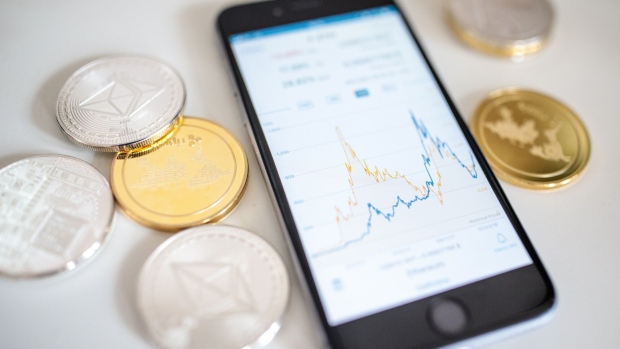Apr 9, 2024
Crypto Trader’s $110 Million Haul Was Not a Theft, Lawyer Says
, Bloomberg News

(Bloomberg) -- A jailed trader accused of manipulating the Mango Markets cryptocurrency exchange to steal $110 million was actually executing perfectly legal, high-risk trades and had no intent to defraud anyone, his lawyer told jurors at the start of a criminal trial in New York.
Prosecutors accuse Avraham Eisenberg of manipulating Mango Markets futures contracts on Oct. 11, 2022 — when he boosted the price of swaps by 1,300% in 20 minutes — and then “borrowed” against those inflated contracts using anonymous accounts before fleeing the country. The government claims Eisenberg stole the money.
But defense lawyer Sanford Talkin argued on Tuesday that his client had simply been participating in a part of the crypto world with different rules from those in traditional finance. Like other Mango Market traders, Eisenberg wasn’t required to reveal personal information, show his creditworthiness or state an intent to repay any loans, the lawyer said. He risked $13 million in executing his strategy, Talkin said.
“They were operating in a sector of cryptocurrency that’s high risk,” Talkin said. “People go in with their eyes open and they know they can do it because they can get a large return in a short amount of time. Sometimes astronomical.” Within that world, Talkin said, “Avi Eisenberg executed a successful, legal trading strategy.”
Decentralized
Mango Markets is run by smart contracts and overseen by a decentralized autonomous organization, or DAO, that lets people borrow, lend and trade cryptocurrencies. The theft alleged by prosecutors is one of the largest in criminal cases involving a DAO and apparently will be the first time a US criminal jury will weigh what type of “DeFi” transactions are legal.
Eisenberg is accused of commodities fraud, commodities manipulation and wire fraud. The US alleges Eisenberg deceptively used two anonymous accounts at Mango Markets to buy and sell himself futures contracts. Those contracts were based on the relative value of Mango’s token, known as MNGO, and a stablecoin called USDC.
The MNGO token is not a commodity under the law, and the smart contract “totally excludes the intent of the borrower to repay the loans,” Talkin told jurors. “The government is basing their case on an obligation that doesn’t exist.”
‘Created to Con’
In her outline of the case, prosecutor Tian Huang likened Eisenberg’s actions to a con artist who sells someone cheap plastic jewelry and passes it off as an authentic diamond ring.
“He used an asset with a big and artificial value he had created to con Mango Markets into convincing them to borrow over $110 million of cryptocurrency,” Huang said. “He wasn’t really borrowing. He was stealing. Avraham Eisenberg ran off with the crypto. And when the defendant did this he committed fraud and market manipulation.”
She said Eisenberg found his target in Mango Markets, “pumped” the value of the MNGO token, executed his con by using an account in the name of a Ukrainian woman, and fled the US within a day. He soon agreed to repay $67 million to the Mango DAO in exchange for it not pursuing any criminal investigation against him, Huang said.
“The defendant thought he had it made, that he had bought himself out of trouble, that he had gotten away with it,” the prosecutor said.
Eisenberg, who was living in Puerto Rico, flew to Israel the next day. He was arrested in late December 2022 as he flew back to Puerto Rico. He’s been in custody since then, after prosecutors argued he was a risk of flight.
The trial is expected to take two weeks. The jury includes a Millennium Partners employee who formerly worked at Goldman Sachs Group Inc.; a chief investment officer of a family office; a Broadway performer and choreographer; and a line producer for films and television.
The criminal case is US v. Eisenberg, 23-cr-00010, US District Court, Southern District of New York (Manhattan).
©2024 Bloomberg L.P.





